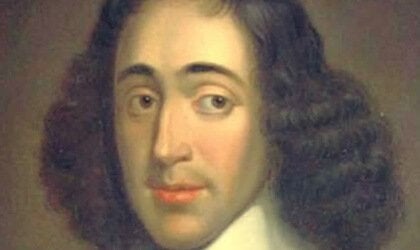Spinoza prayers have a unique combination of simplicity and depth that only great intelligences produce. Many philosophers, such as Hegel and Schelling, considered him the father of modern thought. On the other hand, before these philosophers of such a complex prose, their statements are transparent and understandable.
Baruch Spinoza was born in Amsterdam, Holland, in 1632, a Jewish family has been persecuted for generations, we have references to their escapes in Spain, Portugal and France, only in Holland they found an atmosphere that allowed them to settle This can explain why in Spinoza’s works and phrases the subject of religion occupies a central place.
- The purpose of this philosopher was not to propagate religious beliefs.
- But to challenge them.
- So he was expelled from Judaism and several of his works have been forbidden.
- After his death.
- It was his friends who published much of the material he had written.
- Many of Spinoza’s phrases have impressive lucidity that we admire to this day.
- Here some of them.
“I tried not to laugh at human actions, not to deplore or hate them, but to understand them. -Baruch Spinoza-
One of Spinoza’s phrases about repentance says, “I have no regrets. Whoever regrets what he has done is doubly miserable. By the 17th century, this phrase was completely revolutionary: many of her contemporaries considered it profane and offensive. “
We must remember that one of the fundamental pillars of Christianity is repentance, today we see this concept from a very secular perspective, but in spinoza’s time talking about repentance was almost blasphemy, today these words lead us to reflection. Let us think: with what resentments and guilt do we walk?
Spinoza was a freethinger ahead of his time. His goal was neither dogma, nor prejudice, nor unfounded beliefs. His liberal spirit gave his ideas a deep critical sense.
Then, in one of his sentences, he declares, “There is as much difference between heads as there is between tastes. “This small statement in favor of diversity of thought did not have much acceptance among his contemporaries. At that time, truths without exception and unique and powerful reasons were greatly appreciated.
Spinoza says: “The most important activity a human being can do is to learn to understand, because to understand is to be free. “In this sentence, one of the reasons why this Dutch philosopher was considered one of the great rationalists of all time is explicit.
In this declaration freedom takes on a very high value, it is also emphasized that it is born of reason, of understanding, which contradicts what prevailed in the culture of the time, when talking about freedom was suspicious and rejecting religion almost an act of madness.
Spinoza has established a before and after, especially in the field of ethics, his quotations appear in works by Freud, Lacan and Foucault, his work has left such an impact on the Western spirit that much of what is postulated today is rooted in the ideas of this Dutch philosopher.
Another of his claims is: “We don’t want something because it’s good, but quite the opposite. Is it said that something is good because we want it? It’s a careful observation of human nature. He speaks of the subjective distortion that is produced by personal tendencies, that is, the emotion that, in many situations, imposes itself on thought.
Spinoza’s work was forbidden and kept in the dark for almost a century because he treated God with a renewed vision, which was not very well received by the most powerful and dogmatic of the time, he managed to distinguish between religion and reason, which did not he was well regarded by those who wielded religious power.
One of Spinoza’s phrases reads: “Those who, when they ignore something, turn to God’s will, are totally insane: a ridiculous way, no doubt, to confess their own ignorance. “Although he himself was a deeply religious man, in this sentence he speaks of the existence of other forces, many of which are under our control, to shape the future.
Baruch Spinoza faced great ideological pressures of his time, yet he never stopped thinking freely and analyzing everything independently, died of tuberculosis at the age of 44, his only belongings being two beds, two tables, a lens cleaning kit and 150 pounds. .

